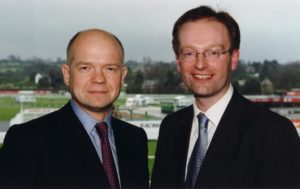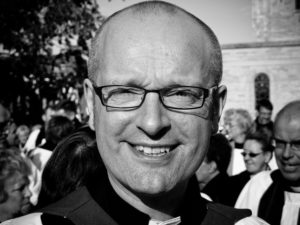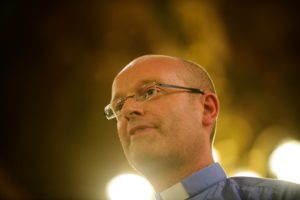In the latest of our Northern Roots series, where we speak to people originally from Northern Ireland but currently living elsewhere, our interviewee is Philip Cochrane. You can follow Philip on Twitter @PhilipCochrane.
1. Tell us about yourself. When did you leave Northern Ireland, and where did you go? What do you do now?
I am (almost!) 47 years old and live and work in Banbury, Oxfordshire where I am the Church of England Vicar of the historic parish church, St Mary’s. (I am also Area Dean but that won’t mean anything to most people.)
I was born just after the Troubles started and was raised on a north Antrim dairy farm which takes in the bit of coastline near Dunluce Castle. A stunning backdrop to everyday life which was easy to take for granted. I went to school in Bushmills and Coleraine.
I felt very awkward as a child and always a bit of a social misfit, so I compensated by developing a confident exterior. The interior me was anything but!
I left Northern Ireland to go to university in Aberdeen and then Reading, studying Politics & International Relations. I bought my first house when I was 19 – too old too soon, but I try and make up for it now! I then moved to Buckinghamshire for work in Aylesbury and ultimately in London. This is when I got married and first got involved properly in politics and was an elected County Councillor and was involved particularly in the areas of education, youth and family services. This led to being a Parliamentary Candidate in Staffordshire for a marginal constituency – I didn’t win, though!
The next move was to Hampshire where I worked in employee benefits and communications consultancy. It was there that I began the process of testing a vocation to ordained ministry in the Church of England (the irony for an Ulster Presbyterian!) – resulting in study in Bristol before ordination in Portsmouth. I have then worked in Hampshire, then briefly south Wales and then to where I am now. I have lived in Northern Ireland, Scotland, England and Wales (do I qualify for airmiles or something?!). While my marriage ended after twenty years, I still am the proud father of two sons.
I am involved in various aspects of community life in Banbury, including being Chair of Governors of the local Primary School and of a new pilot scheme to tackle deprivation in the town. More widely, I am involved in working towards biblically-based inclusion of lesbian, gay, bisexual and trans people within the church and society as a whole. I am also a Fellow of the Royal Society for the encouragement of Arts, Manufactures and Commerce – our mission is to enrich society through ideas and action.
2. What do you think when you see the Northern Ireland of today, in the news and on social media?
In terms of what I see through all forms of media, it is mostly negative – except the touristy bits! The political impasse at Stormont is of course deeply frustrating and it feels like there just isn’t the calibre of political leadership across the board to make the bold decisions and offers to move things along.
The fact that a marriage contracted elsewhere in the UK is not recognised in Northern Ireland is astonishing, especially when many Unionists are the ones blocking it. The DUP tie in with the Conservatives is also something which ties the hands of the UK government in its dealings with Northern Ireland. A bit of a mess, really.
3. Are you hopeful for Northern Ireland’s future? Will Brexit make a difference?
I am a natural optimist, you have to be hopeful – there are changes that have taken place in Northern Ireland already which I never thought I would see in my lifetime.
I think the problem is that, after the presenting issues were largely addressed through the Good Friday Agreement i.e. the daily murders and establishment of devolved government, the energy to address the more complex and fundamental root causes seemed to dissipate.
So, while murders of my childhood are now a distant memory for many, the community divisions and tribalism remain.
Of all the regions of the UK, Northern Ireland has the most to lose from a bad Brexit agreement. How to manage a border when one part is in the EU is pretty hard to imagine, but the idea of a land border is a horrific prospect. I remember the check points of my youth and feels like a massive step back if that does happen. I hope that a solution can be found that really does mean that doesn’t happen.
The Republic of Ireland is a major trading partner and our neighbour and there is a shared history for all those who live on the island of Ireland.

4. Do you think you will return to Northern Ireland? What could convince you to come back?
If you had asked me that question before the summer, I would have said no, but coming over for ten days in the summer was a bit of a turning point. I only had a couple of days in north Antrim and then I had rented a house in County Down.
Some of my school friends have returned to Northern Ireland and live in Belfast – it was good to spend time with them; it was just like old times. You realise where your roots are. I saw very little of Northern Ireland when I lived here because of the Troubles.
I was also over at the time of Belfast Pride and that was great to see. One hopeful image that sticks in my mind was of a bystander, a (straight) mother who turned to her little daughter and exclaimed, “Isn’t this wonderful!” And it was.

5. What can Northern Ireland learn from the place you live now?
To not be suspicious of people. The churches here have some way to go, but the churches at home tend to be good at teaching, small groups and fellowship, but outreach is usually done in the form of ‘missions’ or funding, often very generously, other people in service. However, I find that real transformation comes from getting involved directly in serving those in need and on the margins.
6. If Northern Ireland had a president with sweeping powers, and it was you, what would you do?
Dangerous! At the end of the day, you cannot compel people to be more tolerant and compassionate to those who are different to you. However, you can create structures that assist in building relationships and to dissipate suspicion.
There is a careful choreography which means that people of different traditions are kept separate – when I was at school, we went to different schools with different school buses and played different sports. Contact between the different communities was minimal and that is still too much the case. So, children grow up suspicious of ‘the other’. So, I would reform education in Northern Ireland so that all publicly-funded schools were run on an integrated basis.
I would also ensure that marriage equality was implemented. I would also initiate a commission to review the devolution arrangements to see whether or not a more community-based approach might be possible. Certainly, things like the Petitions Of Concern have been abused and these loopholes must be removed.
7. What would you like to see more of on Northern Slant?
I am not a sports person, so I don’t follow that. I enjoy the story-telling and the observations about politics. I also like reviews of places to visit or eat… 🙂
8. If you could ask Northern Ireland politicians (past or present) to dinner, who would they be? And why?
As I can’t have Daniel O’Connell, I would have the Marquess of Londonderry (18 June 1769 – 12 August 1822, known mostly as Viscount Castlereagh) to talk about the Congress of Vienna and to hear more about his personal struggles as well as his strategies and how he got on with the great politicians of his period (Canning Wellington, Peel, etc).
Also, repeating what others have already said, I would like to have got Ian Paisley and Martin McGuinness together to talk about their journey from enemies to the ‘Chuckle Brothers’. Also, what they think about the current situation…

9. Do you have a favourite quote, or mantra?
Can I have two? One is attributed to Edmund Burke: “Evil triumphs when good men do nothing” – the sin of omission, apathy and indifference. Doing nothing is not an option.
The second is attributed to St Irenaeus: “The glory of God is man fully alive, and the life of man is the vision of God.” For me this is about setting our hearts and minds upon God and allowing him to heal and restore us. We can come as we are, not ashamed of who we are – your gender, background, race or sexuality.
10. What’s your message for people back home?
The story of the Good Samaritan recorded in the Bible was told by Jesus to explain who our neighbour is. Note it was someone of the same broad faith tradition but Jews did not consider Samaritans to be proper Jews…. and they despised them. They were brought up to be suspicious of the other and they became natural enemies.
Yet this Samaritan demonstrates radical, hands-on and extravagant care, breaking every social taboo in the process. Can we all do the same?
Also published on Medium.
